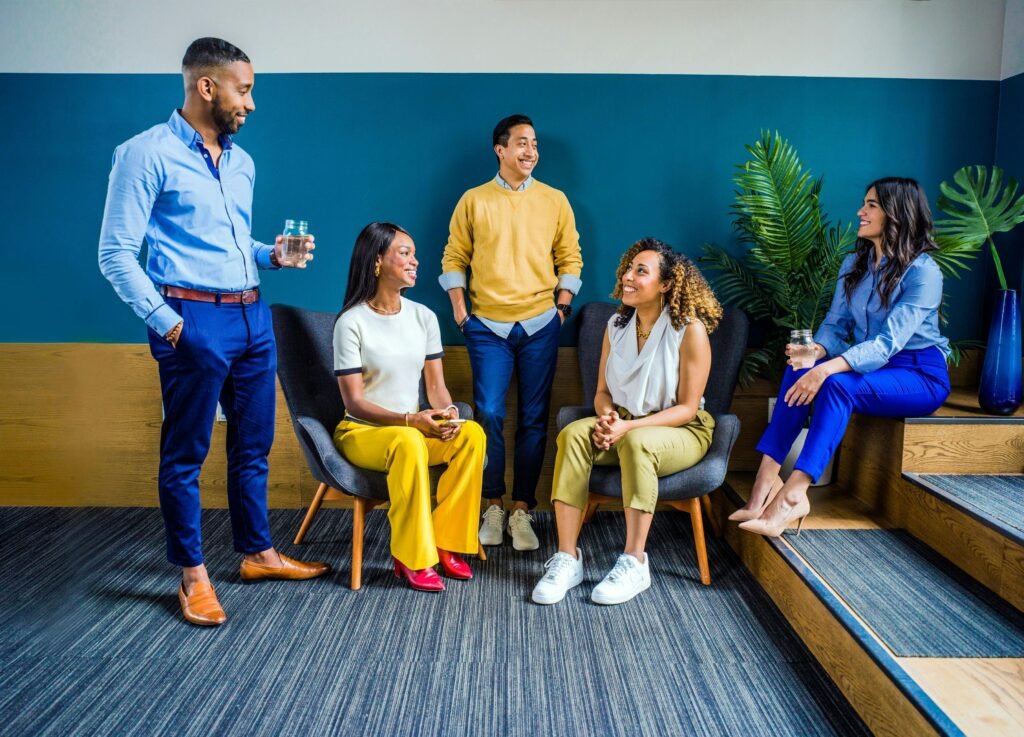
Understanding Real Social Confidence
Understanding real social confidence is all about being true to yourself and feeling good about it.
Forget about putting on an act or trying to be someone you’re not.
It’s all about being comfortable in your own skin and letting that comfort show when you’re interacting with others.
When you’re genuinely you, it shows, and people are drawn to that authenticity.
You know those times when you’ve had to fake a smile or pretend to be interested in something you’re not?
Yeah, that’s exhausting and pretty unnecessary.
Real social confidence comes from the inside out.
It’s about knowing who you are, what you stand for, and being okay with it—even if that means not fitting into every social norm out there.
This kind of confidence lets you glide through social interactions without the stress of trying to fit a mold.
Instead of worrying about what others think, you’re focused on genuine connections.
When you’re comfortable with who you are, you can deal with all kinds of social settings more easily.
Whether it’s a crowded party or a one-on-one coffee date, you handle it with a cool and calm attitude.
Understanding that confidence isn’t about being the loudest person in the room can be a real eye opener.
It’s not about dominating conversations or showing off.
It’s more about being a good listener, engaging with empathy, and bringing your true self to the table.
This way, you build real, meaningful connections, not just surface-level ones.
Social confidence also means knowing your worth and not letting external judgments get to you.
Everyone has those moments of self-doubt, but it’s how you deal with them that matters.
Trust that your voice matters and that you have something unique to offer.
This mindset shift makes social situations a lot less intimidating.
Remember, it’s okay to be a work in progress.
Building real social confidence is a journey, not a destination.
You don’t have to have it all figured out right now.
Each step you take toward being more authentic in social settings helps build a stronger, more confident you.
So, next time you’re stepping into a social situation, let go of the pressure to be perfect.
Focus on being genuine, and you’ll find that real social confidence naturally follows.
Embrace Your True Self

Embrace your true self by loving all the unique qualities that make you, you.
It’s super important to realize that your quirks and differences are what set you apart in a good way.
When you start valuing your own opinions and perspectives, you build a solid sense of self-worth.
This naturally translates into real confidence.
It’s okay to be different.
Everyone has their strengths and weaknesses, and that’s what makes life interesting.
By accepting yourself, you acknowledge that your personality is valuable and worth sharing with others.
This can be a game-changer in how you see yourself and how others see you too.
Stop comparing yourself to others.
Social media can make it look like everyone else has their life together, but that’s usually not the full story.
Focus on your journey and what makes you happy.
When you do, you’re more likely to attract people who appreciate you for who you are, not who you’re trying to be.
It’s also important to give yourself some grace.
Nobody’s perfect, and that’s totally okay.
When you make mistakes or feel out of place, don’t beat yourself up.
Learn from those moments and move on.
This attitude not only helps in building self-confidence but also makes you more resilient in social situations.
Spend time doing things you love and are passionate about.
Whether it’s a hobby, a sport, or just reading a good book, engaging in activities that make you happy boosts your mood and your self-esteem.
When you’re passionate about something, it shows, and people are naturally drawn to that energy.
Surround yourself with supportive people.
Having a circle of friends or family who lift you up and accept you for who you are can make a huge difference.
These are the people who’ll remind you of your worth when you’re feeling down and encourage you to step out of your comfort zone.
Finally, practice self-compassion.
Treat yourself with the same kindness you’d offer a friend.
This means not being too hard on yourself and acknowledging your efforts and achievements, no matter how small they might seem.
Self-compassion is a powerful tool in building genuine social confidence.
Remember, embracing your true self is a journey, but each step you take helps you grow stronger and more confident in your own skin.
Practice Active Listening

Active listening is like a secret weapon for building social confidence.
It’s all about really paying attention when someone is talking to you.
We’re talking about more than just hearing words—it’s about catching the vibe, the emotions, and the unspoken stuff too.
When you focus on what the other person is saying, you show that you genuinely care about their thoughts and feelings.
This naturally makes your interactions deeper and more meaningful.
So, how do you nail active listening?
Start by giving the person your undivided attention.
Put your phone away, make eye contact, and nod along to show you’re engaged.
These little gestures go a long way in making the other person feel heard and valued.
Also, try not to interrupt or think about what you’re going to say next while they’re still talking.
Just let them speak and take it all in.
Reflecting back what you’ve heard can also be super effective.
Phrases like, “So, what you’re saying is…” or “I get that you’re feeling…” can show that you’re really tuned in.
It also gives them a chance to clarify if you’ve misunderstood anything.
It’s a win-win—you get to understand them better, and they feel genuinely listened to.
Asking follow-up questions is another great way to practice active listening.
It shows that you’re not just passively absorbing information, but are genuinely interested in continuing the conversation.
Questions like, “How did that make you feel?” or “What happened next?” can keep the dialogue flowing and make the other person feel valued.
One thing to keep in mind is to be empathetic.
Try to put yourself in their shoes and understand their perspective.
This doesn’t mean you have to agree with everything they say, but showing that you understand where they’re coming from can build a strong connection.
Body language is a big part of active listening too.
Lean in a little, keep an open posture, and use facial expressions that match the tone of the conversation.
These cues show that you’re fully engaged and interested in what they have to say.
Overall, active listening is about making the other person feel seen and heard.
When you do this, you naturally become more confident in social interactions because you’re creating real, authentic connections.
Set Achievable Social Goals

Setting achievable social goals is a game plan that works wonders for building real social confidence.
Start small and work your way up.
It’s like leveling up in a game; each small win gives you the confidence to tackle bigger challenges.
Start with something simple, like making eye contact with people you pass on the street or saying hi to a neighbor.
These tiny steps can make a huge difference.
Next, try to engage in a short conversation with a coworker or someone you see regularly, like the barista at your favorite coffee shop.
It doesn’t have to be a deep conversation—something light and casual works just fine.
The goal here is to get comfortable with initiating interactions. Remember, every big journey begins with a single step.
Once you feel a bit more comfortable, set a goal to attend a small social event.
It could be a friend’s gathering, a local meetup, or even a community event.
Don’t stress about being the life of the party. Just showing up is a victory.
Give yourself credit for making the effort to get out there and mingle.
Another great goal is to join a group or club that aligns with your interests.
Whether it’s a book club, a sports team, or a hobby group, being around people who share your passions makes it easier to strike up conversations and build connections.
Plus, doing something you enjoy adds an extra layer of comfort.
Make a list of these small goals and tick them off as you achieve them.
Celebrate your progress, no matter how minor it seems.
Each goal you accomplish is a building block for your confidence.
If you find yourself feeling anxious, remember that it’s okay.
Everyone has off days.
Just keep pushing forward at your own pace.
Also, practice saying yes to social invitations.
It’s tempting to decline and stay in your comfort zone, but stepping out even when it feels a bit uncomfortable helps expand your social skills.
It’s like building muscle; the more you do it, the stronger you get.
Lastly, don’t be afraid to reward yourself for your efforts.
Treat yourself to something you love after hitting a goal. Positive reinforcement can keep you motivated and focused on your progress.
Develop Strong Body Language

Body language is like the secret sauce to social confidence.
You know that saying, “fake it till you make it”? Well, here you don’t have to fake anything.
Start by standing up straight and keeping your shoulders relaxed.
Good posture not only makes you look more confident but also makes you feel more confident.
Eye contact is a biggie.
When you’re talking to someone, look them in the eyes.
Not in a creepy way, of course, but in a way that shows you’re engaged and interested.
Eye contact helps build trust and makes interactions more personal.
But don’t overthink it—just be natural.
Smiling is another powerful tool.
A genuine smile can break the ice and make both you and the other person feel at ease.
Plus, smiles are contagious.
When you smile, the other person is likely to smile back, and that makes the whole conversation flow better.
Your hands also say a lot about how you’re feeling.
Keep them out of your pockets and avoid crossing your arms, as these can make you seem closed off or anxious.
Use hand gestures to emphasize points when you talk.
It adds a layer of expression that words alone sometimes can’t convey.
Pay attention to your feet too. Pointing them towards the person you’re talking to shows you’re engaged.
If you find yourself fidgeting or tapping your feet, take a deep breath and try to relax.
Those little habits can signal nervousness, even if you don’t feel that way.
Lean in a little when someone is talking to you.
It shows you’re interested in what they’re saying.
Just make sure to respect personal space—nobody likes a close-talker.
Mirroring the other person’s body language can also help build rapport.
If they’re relaxed, try to match that energy.
If they’re enthusiastic and animated, don’t be afraid to show a bit more energy yourself.
This subtle mimicry makes the other person feel more connected to you.
Lastly, don’t forget about your voice. Speak clearly and at a moderate pace.
You don’t have to shout to be heard, but make sure your voice carries enough to be understood.
A confident tone of voice can make a big difference in how your message is received.
Engage in Self-Reflection

Engage in self-reflection by taking some time to understand your social interactions and how you feel about them.
Grab a journal or even just your phone’s notes app and jot down some thoughts after social encounters.
What went well? What didn’t? Pinpoint those moments that made you feel awkward or uncomfortable.
Getting to know these triggers can really help you figure out what to work on.
Ask yourself questions like: “Why did I feel anxious talking to that group?” or “What made me feel good about that conversation?”
By digging into these feelings, you can start to see patterns.
Maybe you’re more relaxed in smaller groups or when talking about certain topics.
Knowing this helps you set yourself up for success.
Think about past social wins too.
Remember those times when a conversation flowed effortlessly or when you felt really good in a social setting?
What made those moments click?
Reflecting on these positive experiences can give you clues about what works for you and can boost your confidence.
Sometimes, it’s helpful to get an outside perspective.
Talk to a trusted friend or family member about your social interactions.
They might offer insights you hadn’t considered or remind you of your strengths that you tend to overlook.
Plus, having someone in your corner cheering you on can be a great confidence booster.
Consider the kind of people you feel most comfortable around.
Are they more laid-back or energetic?
Do they share similar interests or values?
Reflecting on the types of social environments and personalities that make you feel at ease can guide you in seeking out similar settings in the future.
Mindfulness can also play a big role in self-reflection.
Spend a few minutes each day just being present and noticing your thoughts and feelings without judgment.
This can help you become more aware of your emotional responses in social situations and give you a clearer picture of what needs a bit of tweaking.
Don’t forget to acknowledge your progress.
Even small steps forward are still steps forward.
Reflect on what you’ve achieved so far and give yourself credit where it’s due.
Self-reflection isn’t just about finding areas for improvement; it’s also about celebrating your growth and strengths.
Expand Your Comfort Zone

Taking baby steps outside your comfort zone is key to building social confidence.
Start with situations where you feel somewhat comfortable, then push the boundaries a bit more each time.
Maybe you’re cool chatting with a friend of a friend—next time, try striking up a conversation with someone new at a social event.
Small challenges add up and make a big difference over time.
Another great way to expand your comfort zone is to mix things up in your routine.
If you always go to the same coffee shop, try a new one.
If you stick to the same social circle, make an effort to meet new people through hobbies or classes.
Fresh experiences keep things interesting and help you adapt to different social settings.
Role-playing scenarios can also help.
Think about situations that make you nervous and play them out in your head or with a friend.
This way, you’re better prepared when the real thing happens.
It’s like practice runs for social situations.
Public speaking is another biggie.
Even if it terrifies you, starting small can help a ton.
Maybe give a short toast at a family dinner or share your thoughts in a group meeting.
Speaking in front of others builds confidence that translates into other social interactions.
Joining clubs or groups related to your interests can also make a huge impact.
Whether it’s a book club, a hiking group, or a cooking class, being around like-minded people can make socializing feel more natural and less stressful.
Don’t forget to celebrate your wins, no matter how small.
Maybe you attended a party where you only knew one person or you volunteered to lead a group project at work.
Each of these moments is a step forward in building your social confidence.
Remember, it’s about progress, not perfection.
Each time you step out of your comfort zone, you’re training yourself to handle new social situations with more ease and confidence.
Keep pushing those boundaries, and over time, you’ll see just how far you’ve come.
